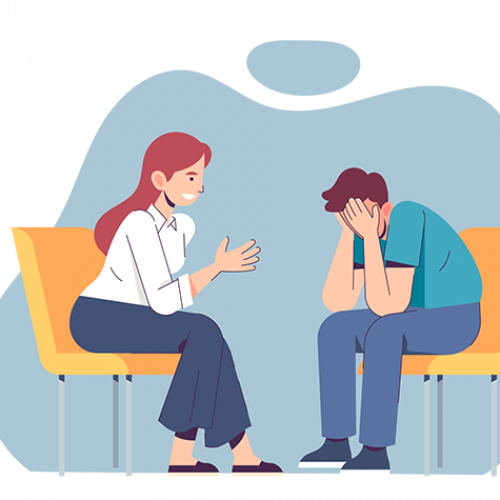Types of Depression
Signs, Symptoms, + Treatment
Depression is a common mental health disorder that can have a profound impact on an individual's quality of life. There are several different types of depression, each with its own unique signs, symptoms, and personalized treatment options. By learning more about the different depression types, it can help individuals determine when they might need treatment.

Types of Depression
When someone says they are depressed or has been diagnosed with depression, it is essential to remember there are numerous types of depression and depressive disorders. Each depressive mental health disorder can negatively impact a person’s ability to function when left untreated.
Major depression is also known as clinical depression. This type involves persistent feelings of sadness, hopelessness, and a loss of interest in activities once enjoyed. Symptoms may include fatigue, sleep disturbances, changes in appetite or weight, and feelings of guilt or worthlessness.
This type of depression persists for a longer period, usually two years or more. It is characterized by chronic low mood and a general lack of motivation. Symptoms are similar to major depression but tend to be less severe and intense.
Individuals with bipolar disorder experience extreme mood swings that alternate between manic episodes, with elevated moods and high energy, and depressive episodes with low energy. Common signs include impulsivity, snap decision-making, and increased risk-taking during manic phases, with depression symptoms similar to major depression during depressive episodes.
Seasonal Affective Disorder (SAD) is a type of depression that occurs seasonally, normally in the winter, from a lack of sunlight. Symptoms may include fatigue, excessive sleeping, overeating as a coping mechanism, weight gain, unexplained sadness, and social withdrawal.
In addition to the typical symptoms of major depression, including low mood and a loss of interest in activities, psychotic depression also involves hallucinations or delusions.
Peripartum depression can occur during or after childbirth due to hormonal changes and stressors associated with parenting. This type of depression is often similar to major depressive disorder. Signs may include feelings of inadequacy as a parent, difficulty bonding with the baby, extreme sadness, and worthlessness.
PMDD is a severe form of premenstrual syndrome that leads to intense mood swings before menstruation begins each month.
This type of depression is triggered by specific life events such as loss or trauma. Symptoms can vary from person to person, depending on the situation. However, common ones include feeling sorrow, grief, sadness, guilt, withdrawal from others, avoiding social situations, and self-isolating.
Atypical depression is a subtype of major depressive disorder characterized by distinct symptoms that differ from typical depression. Individuals with atypical depression may experience temporary improvements in mood in response to positive events or situations.
Other symptoms can include increased appetite and weight gain, excessive sleeping, extreme sensitivity to rejection, and a general sense of heaviness, weakness, or paralysis-like sensations in their extremities.
Treatment-resistant depression (TRD) is a type of major depressive disorder that does not respond well to standard treatments. This condition can be challenging for individuals, requiring a more comprehensive approach and potentially more intensive interventions.
Signs and symptoms of TRD are similar to those of other depression types but persist despite treatment interventions and can include:
- Persistent feelings of sadness, hopelessness, or emptiness that do not improve with treatment
- Loss of interest or pleasure in activities once enjoyed
- Changes in appetite or weight
- Sleep disturbances (insomnia or oversleeping)
- Fatigue and low energy levels
- Difficulty concentrating and making decisions
- Self-harm and suicidal thoughts or behaviors
- Irritability or agitation
- Lack of motivation
- Inability to engage in daily tasks

How Are These Types of Depression Treated?
The different depression types can be treated through various therapeutic approaches and interventions. The treatment for each type may vary depending on the specific symptoms, severity, and individual needs. Some common treatments for different types of depression include:
- Transcranial Magnetic Stimulation (TMS) Therapy: TMS is a safe, non-invasive procedure that uses magnetic pulses to stimulate brain cells in targeted regions and improve mood.
- Ketamine Therapy: Ketamine can be beneficial in treating depression. It is often fast-acting and leads to rapid improvements in mood and mental well-being.
- Psychotherapy: Various forms of psychotherapy, such as cognitive-behavioral therapy (CBT), individual counseling, and dialectical behavior therapy (DBT), can help individuals identify negative thought patterns and develop coping strategies.
- Medication-Assisted Treatment (MAT): MAT may be used, which involves prescribing medications to help alleviate specific depressive symptoms.
- Nutritional Services: Nutritional services can help people make dietary changes through nutritional counseling to support better health. This can lead to improved wellness and mental health.
- Holistic Therapies: Holistic therapies help restore balance to the mind-body-spirit connection and include yoga, meditation, mindfulness, and art therapy that utilize a whole-person approach for relieving depressive symptoms.
- Support Groups: Support groups provide individuals with the opportunity to connect with peers who are also struggling with depression, share their experiences, receive encouragement, and develop a strong support network.
Begin Depression Treatment in Atlanta Today!
Take the first step to overcoming depression and reclaiming your mental health and well-being at Atlanta Integrative Psychiatry. Our compassionate and caring team provides personalized care and treatment options to address your specific symptoms and treatment goals. Stop letting your depression hold you back from a brighter future. Contact us today to start depression treatment in Atlanta now.
You are not alone. You deserve to get help.
Atlanta Integrative Psychiatry is an Industry leader in mental health treatment . Our team of top medical experts specialize in dual diagnosis treat and are committed to ensuring that each patient is treated as an individual.
Call us today, we're avialable 24/7.




